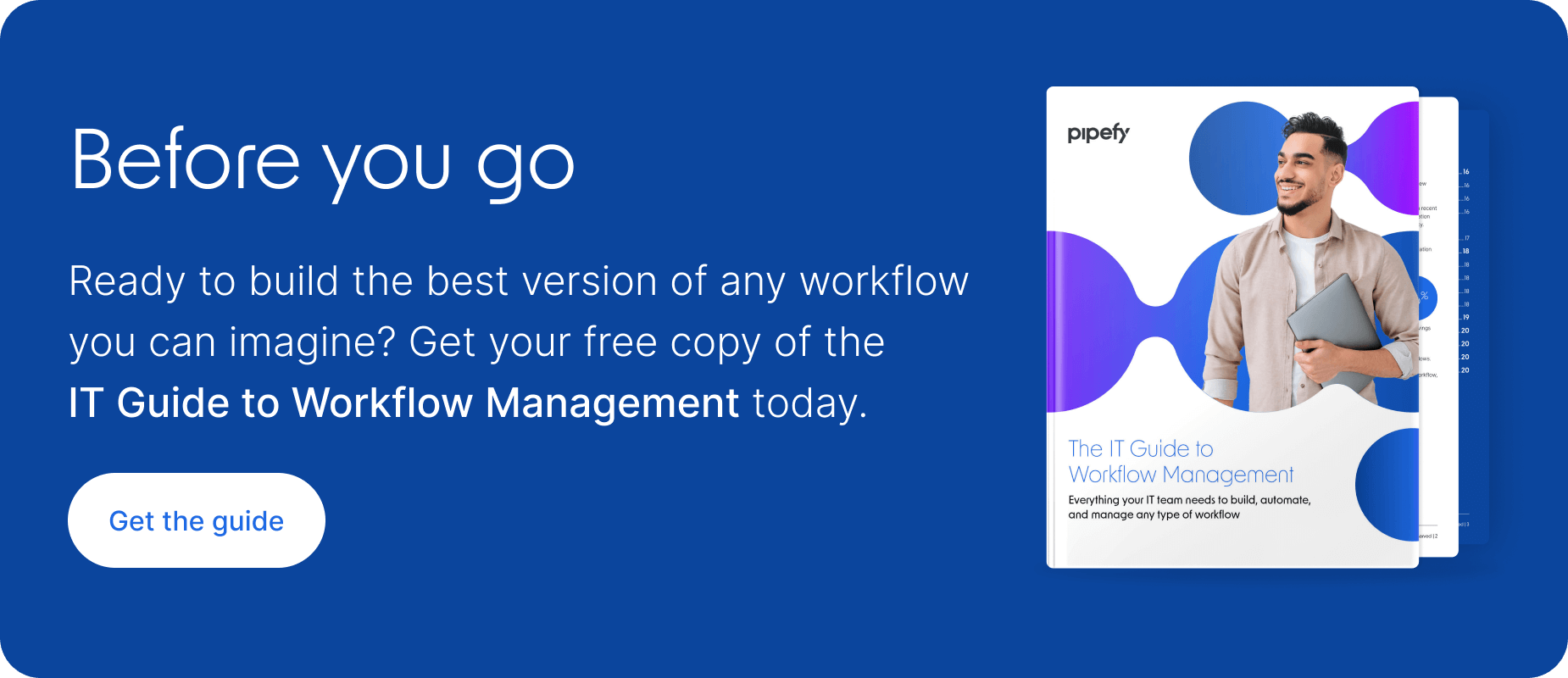ARTICLE SUMMARY
Your customer's needs and expectations evolve at a fast pace. How can you keep up with them and make sure they don't leave you? Click here to find out!

This article was co-written by Walter Popper, managing partner at FCB Partners and Isabelle Salemme, Pipefy’s Content Manager
First of all, let’s get to the facts: We live in a competitive, ever-changing market. What you believe is good enough today may not be good enough tomorrow. That goes for everything: Products, services and – why not? – internal operations.
As the environment evolves you’ll need to evolve as well. If you don’t, you’re sure to fall behind. Customers can, and will, expect your workflows to match their requirements, your processes to match theirs, your whole offering to fit into theirs. How can you keep up with that?
Workflow management: Keep up with your customer’s expectations
Even though you may have already mapped and designed your workflows it’s extremely important to keep in mind that process modeling is not an exact science – nor should the resulting model be static.
When we mention workflows, we’re not talking exclusively about your company’s internal procedures. You need to include all processes that may possibly influence your customer experience.
Every interaction between you and your customers, from ordering and payment to use and maintenance, is a process and, therefore, should be actively managed. It’s the only way to meet, let alone exceed, your customer’s expectations.
These interactions define the customers’ overall experience. Every contact point is a chance to impress your customers and build loyalty, or annoy them and drive them away, leading them straight to your competition.
By the way, speaking of the competition, it’s likely your competitors are always looking for any weak spots they can exploit, ways to steal your customers. So be careful. Don’t always forget, ‘keep your friends close and your enemies closer‘.
Ok, you can’t expect customers to be endlessly satisfied with the experience you offer if you don’t keep up with their demands. So you want to improve. How can you ensure you’re evolving and improving in ways that matter to your customers, and ways that will pay off for you?
Each interaction that influences your customer’s perception and experience is influenced, in turn, by a lot of factors we can refer to as “what” (product or service), “who” (process performers), and “how”.
All factors are important and it’s the combination that builds customer experience. People often make the mistake of focusing exclusively on the tangible aspects, but the “how” is the most important of all.
The secret of great customer experience lies in operational excellence, a disciplined design and execution of all the “hows” based on rigorous process management. And that includes not just process design but:
- People and technology: The latter has been evolving faster than ever. To keep up with your customers, you’ll need to stay updated on the latest tech trends and innovations and begin to experiment with those that seem promising.
- Measures and accountability: Establish measures and set targets, with a view to those few measures with the greatest impact on customer experience. Then clarify who’s accountable for achieving those targets. With today’s systems, you’ll find measures everywhere. To start, be selective. A few measures go a long way.
- Leadership and governance: You’ll also need ways to maintain a customer focus, coordinate across internal silos, allocate scarce resources. Look for top-down sponsorship. Then establish a process council, with each silo represented.
- Expertise and culture: Better collaboration, greater customer focus, individual and team accountability. Those are the values you’ll need to instill across the company.
In a competitive, fast-moving market you’ll need to evolve. These are just some starting points. If you don’t address these factors you’ll be stuck with ‘good enough’ thinking while your customers move on.
But if you pick a few and get started, you can begin to change the mindset of those around you. Soon you’ll begin to see early successes – small wins with a few customers, small efficiency gains due to a few technology-enabled process improvements. And momentum will build from there.
Walter Popper is a co-founder and managing partner at FCB Partners where he advises senior executives on business transformation, process innovation, organization strategy, and change leadership.






